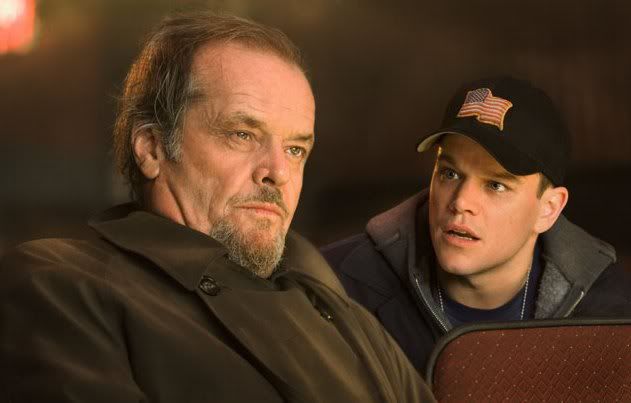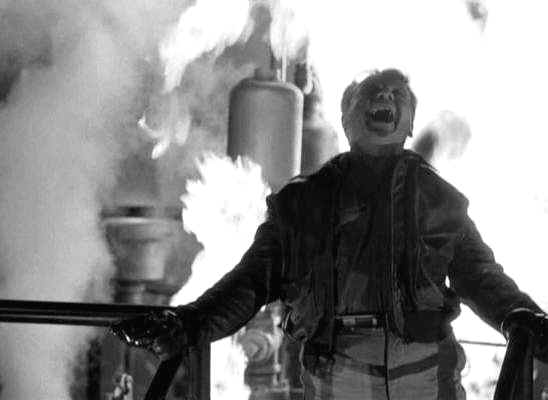 Asiong in action.
Asiong in action.This might as well be the first time that I'm reviewing a film without a director. Of course it was, during production, helmed by veteran film director Tikoy Aguiluz, whose film "Segurista" I truly admire. But because of some post-production politics and creative clashes between him and the producers, Aguiluz's name, by his own request, was removed from the posters and the film itself, leaving screenwriters Roy Iglesias and Rey Ventura as the only people left at the top of the creative hierarchy.
"Manila Kingpin: The Asiong Salonga Story" was, above all, branded as a resurrection of sorts for the very dead action genre of the local film scene: an alternative cinematic reality reigned over by the likes of Lito Lapid, Rudy Fernandez, FPJ, and lots and lots of blazing machismo. It was truly a haven of myth-making capable of solidifying silver screen stars such as Ramon Revilla Sr. as an amulet-empowered 'crime does not pay' icon and Paquito Diaz as villainy and ruthlessness personified. This is the powerful formula only action movies have the strength and endurance to carry on for more than 40 years or so without looking, even at the slightest bit, exhausted. And in this film's case, it was that same, enduring formula that was utilized by George Estregan Jr. (or E.R. Ejercito) and company to serve us thirsty fans a tribute to the genre's lore and also a blood-drenched gangster tale that we can call our own.
Namely, some of the film's strengths are its exquisite cinematography and set design, which have genuinely evoked the 50's period with its nostalgic, often times claustrophobic and grayish visual treatment. Take note, 'evoked', not 'replicated'. If replication is the film's real intent, then they should have gone braver and filmed it in full color. But with its purpose being to merely create a distinct visual 'feel' completely free to express its own artistic liberties rather than to completely emulate a bygone era to the teeth, "Manila Kingpin: The Asiong Salonga Story" succeeded.
But although the film has meritoriously upheld its own visually, it has fallen short substantially. The film suffered in severe one-dimensionality in terms of characterization, with George Estregan Jr., most known for merely playing loud-mouthed, smoker-voiced supervillains such as Dr. Zyke in "Batang Z" and Ivan in Andrew E.'s "Extranghero", although showing relative depth and previously unseen dramatic intensity in his performance as the savage but gold-hearted titular crime boss, obviously looked awkward at times as he makes most out of the stereotypically-written lead role. While character actors like the ever so psychotic John Regala and the subtle Ronnie Lazaro seem to enjoy in their respective characters' caricature-like brutality, the always reliable Phillip Salvador suffered in his role's tiring and predictable 'although my brother's a hardened criminal I still love him' mentality as Asiong's older cop sibling.
Ping Medina, one of the best young actors working today, was underused in an underdeveloped character, and so were Yul Servo and Ketchup Eusebio. Though I can't say the same for Baron Geisler's, which fueled and enforced the film's theme of betrayal and split loyalty with his dimensioned, though predictable Judas-like character to Estregan's Jesus Christ. With Geisler and his mocking smiles and stares like that of a manipulative schemer, you can clearly read within his character that it's just a matter of time before he goes all Robert Ford to Asiong's Jesse James behind.
True, "Manila Kingpin: The Asiong Salonga Story" may have, in certain ways, hopefully reverberated the action genre with the urgency of its ambition, thanks to George Estregan Jr. and all the people involved. But I think that in time, this film will and should be more remembered as a pioneering crime film that just happened to have one action scene and two or three kissing scenes (!) more than the usual. And just when I'm merely recovering from a "Mad World" LSS hangover, here comes this film complete with its own instrumental rendition of the said song which puts a preachy, 'this is what you should feel' vibe to an otherwise well-executed, "City of God"-esque bullet ballet of a climax.
Now, despite of my scrutiny of the film no one really asked for, I truly enjoyed watching the film for what it is: A textbook action/crime opera. And as the film's credits roll and as the lights in the theater were switched back on, I can see the geriatric majority of the audience; a bittersweet sight that made me think of one thing: "These are the fans that you've left behind, action genre!" Fans that, for so many years, have settled for those pixelated 16 in 1 Robin Padilla DVDs and Cinema One reruns to compensate for the lack, or even the complete absence, of new, locally-produced action pictures.
Now, with not much left to say, I have appreciated this version more than I thought I would, but I'm still particular of the fact that in the long run and in the overall definition of what cinema is all about, the director's vision matters more than all the commercial-minded producers' combined. Now, can we have the Tikoy Aguiluz cut, please?
"Manila Kingpin: The Asiong Salonga Story" was, above all, branded as a resurrection of sorts for the very dead action genre of the local film scene: an alternative cinematic reality reigned over by the likes of Lito Lapid, Rudy Fernandez, FPJ, and lots and lots of blazing machismo. It was truly a haven of myth-making capable of solidifying silver screen stars such as Ramon Revilla Sr. as an amulet-empowered 'crime does not pay' icon and Paquito Diaz as villainy and ruthlessness personified. This is the powerful formula only action movies have the strength and endurance to carry on for more than 40 years or so without looking, even at the slightest bit, exhausted. And in this film's case, it was that same, enduring formula that was utilized by George Estregan Jr. (or E.R. Ejercito) and company to serve us thirsty fans a tribute to the genre's lore and also a blood-drenched gangster tale that we can call our own.
Namely, some of the film's strengths are its exquisite cinematography and set design, which have genuinely evoked the 50's period with its nostalgic, often times claustrophobic and grayish visual treatment. Take note, 'evoked', not 'replicated'. If replication is the film's real intent, then they should have gone braver and filmed it in full color. But with its purpose being to merely create a distinct visual 'feel' completely free to express its own artistic liberties rather than to completely emulate a bygone era to the teeth, "Manila Kingpin: The Asiong Salonga Story" succeeded.
But although the film has meritoriously upheld its own visually, it has fallen short substantially. The film suffered in severe one-dimensionality in terms of characterization, with George Estregan Jr., most known for merely playing loud-mouthed, smoker-voiced supervillains such as Dr. Zyke in "Batang Z" and Ivan in Andrew E.'s "Extranghero", although showing relative depth and previously unseen dramatic intensity in his performance as the savage but gold-hearted titular crime boss, obviously looked awkward at times as he makes most out of the stereotypically-written lead role. While character actors like the ever so psychotic John Regala and the subtle Ronnie Lazaro seem to enjoy in their respective characters' caricature-like brutality, the always reliable Phillip Salvador suffered in his role's tiring and predictable 'although my brother's a hardened criminal I still love him' mentality as Asiong's older cop sibling.
Ping Medina, one of the best young actors working today, was underused in an underdeveloped character, and so were Yul Servo and Ketchup Eusebio. Though I can't say the same for Baron Geisler's, which fueled and enforced the film's theme of betrayal and split loyalty with his dimensioned, though predictable Judas-like character to Estregan's Jesus Christ. With Geisler and his mocking smiles and stares like that of a manipulative schemer, you can clearly read within his character that it's just a matter of time before he goes all Robert Ford to Asiong's Jesse James behind.
True, "Manila Kingpin: The Asiong Salonga Story" may have, in certain ways, hopefully reverberated the action genre with the urgency of its ambition, thanks to George Estregan Jr. and all the people involved. But I think that in time, this film will and should be more remembered as a pioneering crime film that just happened to have one action scene and two or three kissing scenes (!) more than the usual. And just when I'm merely recovering from a "Mad World" LSS hangover, here comes this film complete with its own instrumental rendition of the said song which puts a preachy, 'this is what you should feel' vibe to an otherwise well-executed, "City of God"-esque bullet ballet of a climax.
Now, despite of my scrutiny of the film no one really asked for, I truly enjoyed watching the film for what it is: A textbook action/crime opera. And as the film's credits roll and as the lights in the theater were switched back on, I can see the geriatric majority of the audience; a bittersweet sight that made me think of one thing: "These are the fans that you've left behind, action genre!" Fans that, for so many years, have settled for those pixelated 16 in 1 Robin Padilla DVDs and Cinema One reruns to compensate for the lack, or even the complete absence, of new, locally-produced action pictures.
Now, with not much left to say, I have appreciated this version more than I thought I would, but I'm still particular of the fact that in the long run and in the overall definition of what cinema is all about, the director's vision matters more than all the commercial-minded producers' combined. Now, can we have the Tikoy Aguiluz cut, please?










